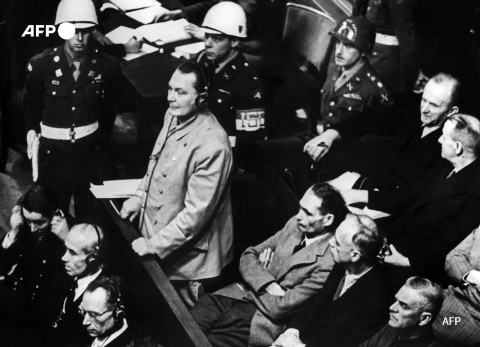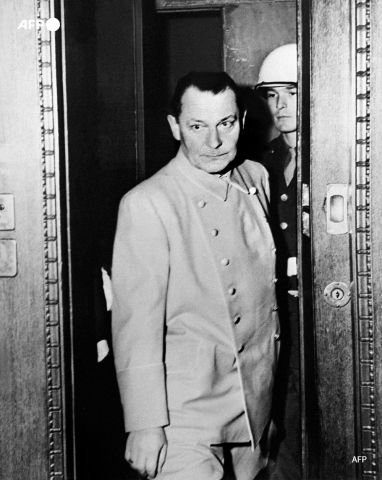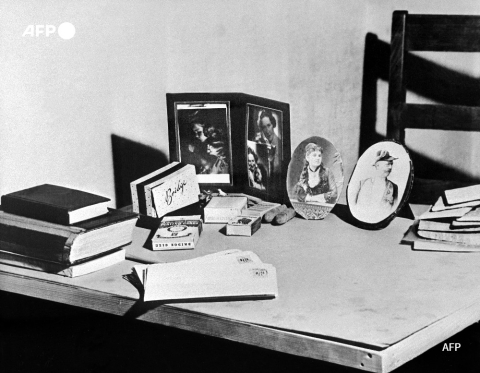Goering : Number two Nazi faces justice

In March 1946, four months after the Nuremberg trials opened following the end of World War II, Hermann Goering stepped into the witness box for the first time.
The top Nazi official to face justice, his questioning lasted eight days.
Below are excerpts of AFP's stories published on March 13 and 14:
NUREMBERG, March 13, 1946 (AFP) - Goering speaks without moving, sitting straight in his chair in the witness box, his chin resting on his chest and looking almost absent. He expresses himself in a subdued and serious voice, but very quickly, and rolling his Rs.
The other accused listen to him attentively, even with respect: for them he remains the big chief, even in adversity and captivity (....) Rudolf Hess closes his crime novels and picture books, while Streicher stops chewing his habitual gum.

For journalists, who were beginning to believe that they would never hear Goering speak, his sudden appearance before the microphone, at a time when all leads to believe that the trial of the court's own witnesses was going to drag on forever, has the effect of a roll of thunder in the blue sky. There is a rush in the telephone boxes.
"I did everthing to strengthen and enlarge the National Socialist Party and to give it power. I did everything to give to (Adolf) Hitler the place to which he had a right, that is to say number one," the former Reichsmarshall exclaims.
"(Our) security required the arrest of all our adversaries. Measures had been taken, already, before us, against the communists....
"The prisons were full. I decided, therefore, the creation of concentration camps which were not a National Socialist invention. Even the name was not found by us. It belongs to history. There were, of course, excesses at the beginning, innocent people were detained and acts of brutality were committed. Nevertheless," exclaimed Goering, "the National-Socialist revolution was the least bloody and the most discipined revolution that history has ever seen."
----------------------

NUREMBERG, March 14, 1946 (AFP) - Several minutes before the opening of the session this morning Goering crosses the courtroom, a fawn coloured leather folder under his arm, to take his place at the little table reserved for witnesses. He sits comfortably, places a glass of water to his right and his folder under his eyes.
He speaks at length with several lawyers while waiting for the court to convene.
Goering is dressed, as customary, in his grey tunic with magnificent black boots.
He had washed himself that morning, replacing the thick dark red scarf with white dots which he has worn around his neck since a short bout of flu two months ago by a light scarf of the same squirrel grey as his uniform as Reichmarshal of the Luftwaffe.
Carefully shaved and his hair brushed back, one could have said it was Goering of the heyday of Nazism, though without his stomach and his medals.
The court rises at 10:00 am. Doctor Sthamer, the accused's defence lawyer, continues questioning his client. (...).

Broaching the Jewish question, Goering says that in 1918, after Germany's defeat, the Jews took an especially important place in Germany. They came from the east of Poland and and "became more and more insolent, while they little by little invaded all the sectors of economic activity."
"The Jews polluted all that was sacred to us. As a result there was a defence movement against them. We wanted Germany to be led by Germans and, as the Jews blew up against us it was an open struggle and it became more and more bitter." (...)
When the hearing resumes, Goering, in reply to his lawyer, says that the National Socialists did not carry out the annihilation of the Jewish race. He explained how the pogroms of November 1938 were caused by news of the attack against a diplomat at the Paris embassy.
They were the work of a "fiercely anti-Semitic" Goebbels. Hitler himself was unaware of the situation and the decision to provoke the anti-Jewish riots had been taken without his knowledge, Goering claims.
